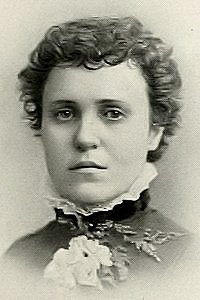Introduction
Born: July 15, 1852, Westbrook, Maine (Herringshaw says July 18, 1853, in Deering, Portland).
Died: July 31, 1916.
Buried: Evergreen Cemetery, Portland, Maine.

Born: July 15, 1852, Westbrook, Maine (Herringshaw says July 18, 1853, in Deering, Portland).
Died: July 31, 1916.
Buried: Evergreen Cemetery, Portland, Maine.

Eliza was the daughter of William and Hannah Eliza Hannah Phenix.
Educated at the Westbrook Seminary, Portland, Maine (site now occupied by the University of Maine), she began teaching at age 16. She is remembered for her geography textbooks.
Most wonderful are God’s created works,
The earth, the sea, the firmament above,
And all the million orbs of light that shine
To lighten other worlds afar. The mind
Of man can fathom not immensity.
The depth of space beyond the azure blue
That veils the sky is mystery, and earth
Is filled with much the finite mind can ne’er
Unravel or explain. Oh, strange, strange world!
And stranger far than strangest inert things
Is human heart. The hidden springs of life
Lie deep within the soul, in chambers locked
And barred against the outer world—the cold,
Dark world. Too sacred are the inmost thoughts
For careless ear to hear, and every heart
Has tender feelings that it fain would hide.
The fount of purity and sin from which
Flow issues grand of life, is heart of man,
And ’mid its attributes is one akin
To God—the holy tie of love—and love
Alone can sweeten life. The little child
Pours forth its griefs into a mother’s ear,
And feels no fear; for love is there, and where
That bond exists, the heart is opened wide.
O parents, seek to win the love of those
Entrusted to your care; for soon the waves—
The dark and cruel waves of time will waft
Those little barks afar upon the sea
Of life; and if no tender cords of love
Bind heart to heart, the rocks and quicksands dire
Of sin, may shipwreck all your hopes. Keep not
Your kisses for the dead. The living crave
Your tenderness. Cold, frozen lips can feel
No soft caress; and dumb, unconscious clay
Needs not affection’s guiding hand. The light
Of love can brighten not the glassy eye
Of death. Oh! give the little child the love
For which it yearns, and give it this while life
Is throbbing in its veins, and while its heart
Is pure as newly fallen, driven snow.
The One who formed the heart knows well its woe,
Its conflicts oft with sin, its dire distress
And utter wretchedness when all the streams
and all the leaves on tree
Of earth run dry,
Of life are stripped therefrom by sorrow’s hand.
Full oft in love the blows are dealt that wound
And crush the soul, and forth from out the soil
Made rich by suffering, will spring and bud
And bloom bright blossoms sweet—no more to fade.
No tongue can tell the coldness, bitterness,
And barrenness of life without the love
Of God. The pleasures of this fleeting world
But chill and blast and freeze the heart—and turn
To stone that which should tender be, and full
Of sympathy. There is a land where hearts
Will know no pain, where cruel words will ne’er
Be heard, and where God’s righteousness will reign.
We long, O Master kind and true, to rest
Within Thy kingdom blest, and revel in
The joy of everlasting love. And while
We wait for day to come, we’d not forget
Our duty here in darksome night, and thus
Spend precious time for naught, and lose at last
The golden prize; but we would seek to warn
The world, and sow the seeds of truth in hearts
Prepared by God, and so add stars of light
To glorious diadems that we may wear.
Eliza Happy Morton
Still Waters, 1881
If you know Morton’s place of death,